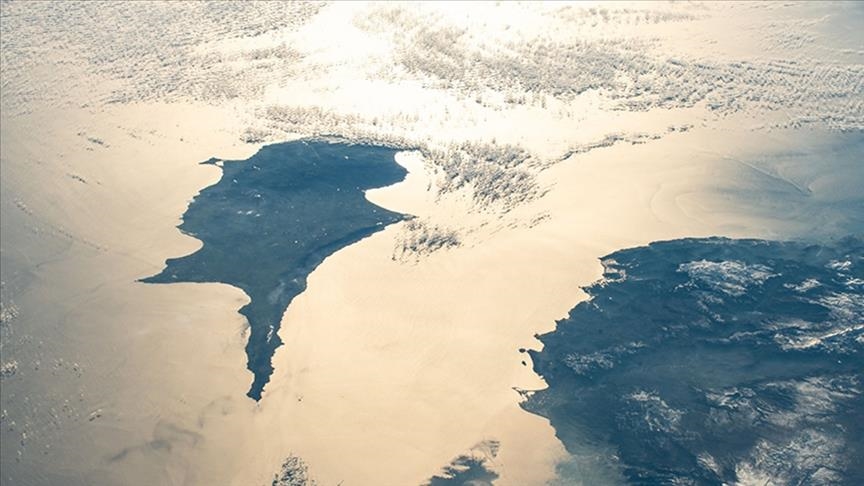Experts highlight Israel's influence in US-Greek Cypriot defense pact
‘Cyprus is the most suitable point for providing direct assistance to Israel,’ Murat Aslan tells Anadolu, believing US presence in Cyprus island is ‘somehow related to Israeli policy’

ANKARA
Experts say a new defense cooperation pact between the US and the Greek Cypriot administration could enhance Washington's military and logistical activities on Cyprus and in the Eastern Mediterranean while also suggesting that Israeli policies have influenced the US presence on the island.
Murat Aslan, a foreign and security policy analyst at Hasan Kalyoncu University in Türkiye’s Gaziantep province and a senior researcher at the Ankara-based Foundation for Political, Economic and Social Research (SETA), said the US has long utilized Greek Cyprus and that its involvement has increased due to Israel’s war on Gaza.
Aslan added that the US sees the Eastern Mediterranean as a critical region due to its geostrategic importance.
Although the Eastern Mediterranean was not the primary reason for the US decision to sign the agreement on Sept. 9, Aslan said the US could use the region for potential future operations, including access to Gaza and global markets and repositioning itself militarily.
He also noted that the US often intervenes in both the Middle East and Eastern Mediterranean with naval and air assets, maintaining mobility and operational flexibility.
Pointing out that any intervention from fixed bases usually requires the approval of the host country, Aslan said that for this reason, the US has slightly reduced its dependence on the Incirlik base in southern Türkiye.
“In terms of Europe's security, it has brought forward bases in Romania and Bulgaria, especially those in Romania. In the Eastern Mediterranean, these ships definitely need a port for logistical needs, either to anchor continuously or at least to complete their logistics. Therefore, it may be the result of the operational requirements of the naval forces," he said.
Politically, Aslan said the UN, rather than the US, remains the dominant actor in the Cyprus issue, noting that US policymakers, regardless of whether Democrats or Republicans are in power, tend to adopt a pro-Greek stance regarding the issue.
Aslan cited fluctuating US-Türkiye relations as a factor shaping American policy.
"As fluctuations in Turkish-American relations persist and the US gains a more effective military and political advantage from the opportunities offered by the current geographical positioning of Southern Cyprus, it will likely adopt a slightly more pro-Greek stance on the Cyprus issue,” he said.
He also pointed to the role of US ambassadors, particularly former Ambassador to Athens Geoffrey Pyatt, whom he described as "pro-Greek." Ambassadors, he said, play an influential role in shaping US policy on Cyprus.
Regarding Israel, he said “Cyprus is the most suitable point for providing direct assistance to Israel. This has always been the case throughout history; it's nothing new,” adding the US presence in Cyprus is “somewhat related to Israeli policy.”
Eastern Mediterranean on US and Western agenda
Mehmet Balyemez, director of the Center of Research of Turkish Cypriot History at Baskent University, emphasized the historical importance of the Eastern Mediterranean and Cyprus, saying the region has been on the US and Western agenda since the Cold War.
The idea of ensuring the security of the Suez Canal, which has almost halved the route between Israel, the West and Asia, has enabled the immediate implementation of Western policies towards the region, Balyemez said.
He stressed that US-centered policies in Cyprus and the Eastern Mediterranean are driven by the need to ensure Israel's security and reduce Russia’s influence in the region.
He also highlighted the construction of two military bases in Cyprus during British colonial rule in the 1950s, which the US continues to benefit from. He warned that the US-GCASC agreement could lead to dangerous consequences for the region.
“One of the aims of the agreement can be said to be to legitimize intervention in developments in the Eastern Mediterranean under US patronage. The GCASC, through such agreements and armament efforts, aims to support US operations in the Eastern Mediterranean while also ensuring its own security against potential attacks.”
“It also seeks to balance the defense and cooperation policies implemented by Türkiye (with the Turkish Republic of Northern Cyprus) which strengthens its military position day by day through such agreements and similar ones.”
He also suggested that the defense cooperation agreement between the US and the GCASC might be a step toward implementing plans for the Eastern Mediterranean and the Middle East in the near future.
Türkiye on Wednesday condemned the signing of a roadmap between the US and the Greek Cypriot Administration on enhancing defense cooperation.
The agreement was signed by the administration’s Defense Minister, Vassilis Palmas, and US Assistant Secretary of Defense for International Security Affairs Celeste Wallander at a ceremony Monday in Nicosia (Lefkosa), according to Greece’s Kathimerini daily.
“This roadmap represents a strong commitment to further enhancing and deepening our relationship,” said Palmas.
Anadolu Agency website contains only a portion of the news stories offered to subscribers in the AA News Broadcasting System (HAS), and in summarized form. Please contact us for subscription options.







